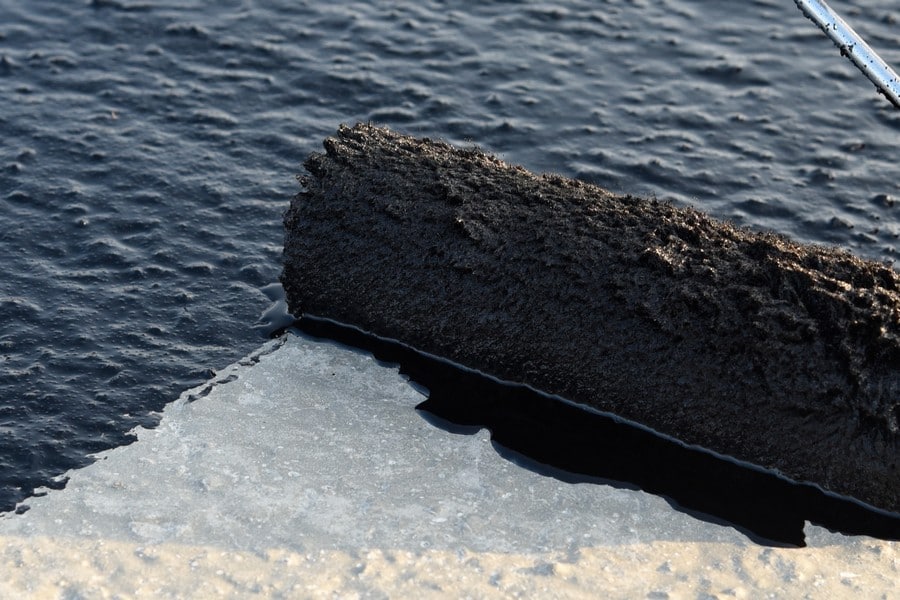Contact Sussex Damp Experts Now to Speak With an Expert.

Mastic Asphalt is one of the most ancient waterproofing compounds, dating back to the Phoenicians. Its unrivalled water-resistant protection is of the highest quality and lasts for years. In 1837, Mr Claridge was the first to patent it in Paris. Claridge’s Patent Asphalt is the result of this. It protects most of the U.K.’s prestigious buildings, including St Paul’s Cathedral and Buckingham Palace, among others.
The substance is made up of a mix of limestone, bitumen, and contemporary polymers that were introduced recently. Its claim to fame is its sturdiness. It can resist both pedestrian and vehicular activity. It’s also non-toxic and non-flammable.
Asphalt comprises aggregates, sand, and bitumen, with the latter serving as a liquid binder that keeps the Asphalt together. To simplify things, we might state that Asphalt is a type of concrete (mixing), whereas bitumen is a type of cement (binder) used in pavements.

It provides an excellent wearing course material and a hard-wearing surface suited for car parks, HGV service decks, and bridge decks by integrating asphalt as paving. Because of its durability and versatility, it’s an excellent waterproof covering for locations with a lot of foot activity.
Mastic asphalt is used to cover tresses, flat roofs, parking lots, pavements, urban roads, public amenities, engineering constructions, and sound insulation.
Mastic asphalt should be applied in one coat at a temperature between 175 and 230 degrees Celsius and spread uniformly by hand or machine on the prepared and regulated surface.
A coating of hot mastic asphalt is applied to the roof surface in this way. This layer is covered with a jute cloth. The jute fabric is then sandwiched between the two layers of mastic asphalt with another layer of mastic asphalt.
Mastic Asphalt is unquestionably the best choice for resisting water and constructing excellent dampproof membranes in various conditions. This versatile material protects against air humidity, which is a typical cause of wetness issues. You can use it to avoid moisture in crawl spaces, basements, cellars, and bathrooms, among other places. It has been used on sidewalks, bridges, parking lots, and balconies since it outlasts practically everything. When you have Mastic Asphalt, any regions prone to penetrating moisture will no longer be a concern. Damp Proofing Can Help Prevent:
Mastic Asphalt has a lifespan of more than 50 years. It’s a popular choice among architects, engineers, and homeowners looking for a long-lasting, waterproof membrane. It’s clear why this product exceeds the competitors. Because of how easily it resists water damage, it is employed in high-end projects like car parks, structures exposed to dampness, and bridges. Even better than its moisture resistance, this product is simple to fix if it wears out or is damaged over the course of five decades (which is highly unlikely.)
In today’s world, environmental conservation and sustainability are critical. As a result, Mastic Asphalt sparkles and stands out. After it has been used for a long time, it is 100% recyclable. When it reaches the end of its useful life as a waterproofing substance, it can be broken into its constituent parts and recycled.
Without a doubt, this is the first industry in the world to attain Carbon Zero status. We are taught that we must all do our part to minimise pollution, and Mastic Asphalt is an excellent way to do so. If you are one of the millions of people who will benefit from the Mastic Asphalt waterproofing solution, you will be helping to make the world a better place by emitting zero CO2.
Designing is also a factor if you are in the process of building attractive asphalt roofs. Roof gardens are prone to dampness because, well, they are gardens. You have plants there and naturally water. Keeping the water out of the house’s structure is not easy unless you have a successful waterproofing material like Mastic Asphalt. Green roof projects have benefited from this material for as long as 80 years at a time. Poured-in-place concrete will benefit from using Mastic Asphalt to make sure that you have the perfect and correct dampproof membrane that will keep the water from seeping into the structure.
Mastic Asphalt is applied in a molten state, and it is typical for people to mix it up with other materials that require the use of naked flames or torches to apply. Typically, material for large projects is delivered to the job site in hot charge tankers for quick installation. This waterproofing substance can be applied in a short amount of time. Pre-heated solid blocks in boilers positioned at ground level for minor constructions. When installing the material, there are no flames used. It is extremely flame resistant and poses no risk of fire.
Mastic asphalt is almost incombustible due to its high mineral content. It was also put through its paces following the prEN1187-1 and prEN1187-2 European draught standards. No considerable flame spread was seen, and there was no flame penetration. When tested in accordance with BS.1476 part 3:1975, mastic asphalt meets all of the external fire resistance requirements for a roof covering and earns the maximum rating (p60) – currently (aa). Mastic asphalt systems are also LPCP-certified for fire protection.
When it comes to safety requirements, Mastic Asphalt ticks all the boxes. It is non-flammable and non-toxic, and it poses no risk to the occupants of a structure that has been treated with Mastic Asphalt. When evaluated with B.S. 1476 part 3:1975, it received the highest rating (p60). It also meets European requirements (prEN1187-1 and prEN1187-2). Mastic Asphalt will not allow flames to pass through.
According to research, this material is the most cost-effective on the market. It is the only reasonable option you have as a waterproofing material that may save costs of alternatives by 10-15% and is known for being durable and long-lasting.
Manufacturers have recently produced innovative polymers that have increased the endurance of Mastic Asphalt to new heights. With modern technology, this material can now protect more than just roofs and a few key areas and can now protect every portion of your home that is susceptible to water damage. It can withstand the elements, heat shock, and frequent automotive and pedestrian usage. It is also cost-effective due to the ease with which it can be mended.
Waterproofing is vital, but so is aesthetics. Protecting yourself from dampness should not mean sacrificing overall beauty. Roof tiles, reflective coatings, timber deck finishes, roof gardens, slabs, and inverted roofs with stone are just a few of the places where Mastic Asphalt looks great. It goes well with the type of design you have or seek. It has a distinct flooring quality that goes with anything, including polished stone flooring like terrazzo. Damp proofing considers typically the system’s design, details, and longevity in case it needs to be reproofed in the future.



The cost is determined by the scope of the project. Roofing prices, for example, differ from flooring costs. For more information, please get in touch with one of our qualified specialists for a price quote.
We follow excellent standards in damp proofing treatments, professional re-plastering, wood preservation and are experts in performing damp surveys.
We provide highly customised, competent, dependable damp proofing treatment and repair services to homes, local authorities, small companies, and commercial property owners. Call us today at 01273 257 765 to speak with a member of our helpful team about your needs.
All of our work is backed by our company’s warranties for your safety and security. We are also founding members of the Guarantee Protection Scheme, an independent insurance policy that covers the duration of your guarantee if you want to take it out.


Max and his team have been at our property all week and I really can’t thank them enough for the fantastic job they’ve done on plastering both our walls and ceilings. They have literally transformed the appearance of our house! Not only has Ma…

From start to finish Max has been incredable. His knowledge lin damp proofing is second to none and his team where very clean and polite. The plastered finish was like glass so happy we choose Max Plastering for job.

Lovely bunch of lads left a very neat and clean job. Problem was solved.

Perfect Finnish and all left clean and tidy and no mess. Used Max previously and would not hesitate to ask him carry out more work.

Max, Harvey and Stuart arrived promptly as arranged. Done a great job on our outside rear wall. Work completed to a high standard, removal of all old material and cleaned up after themselves. I am so pleased with the standard of their work they ar…

They turned up on time and carried out the works in a very professional manor leaving the front of the house clean and tidy. Very impressed would definitely recommend.

I have to say that on every level Max (with Stuart and Harvey) did an extremely professional job! They explained what they were going to do, they were polite and courteous and respected that they were coming into our home. The plastering is of the…

I called max and he managed to come around the same day to do a survey. The next day I received an extremely detailed survey compared to any other damp proofer which made me feel very at ease that he was going to do the right job. Max and team tur…

Contact Sussex Damp Experts Now to Speak With an Expert.